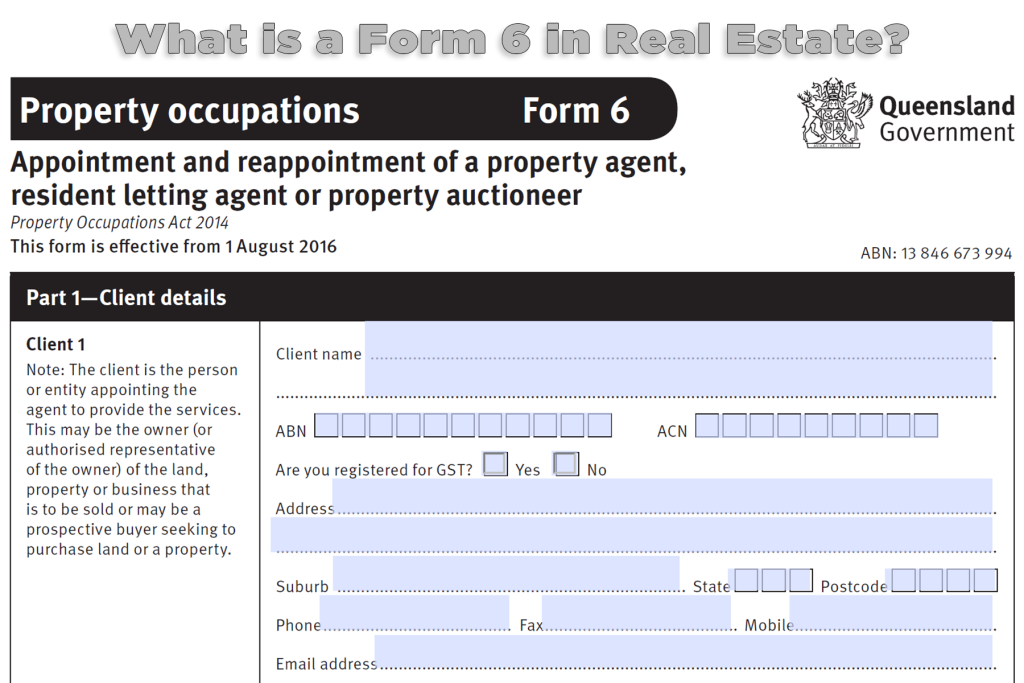

What is a Form 6 in Real Estate? | Understanding Property Contracts on the Gold Coast in Queensland
A Form 6 in Real Estate refers to a Property Occupations Form 6 agreement, it is a critical document that you, as a property owner, will encounter when engaging the services of a real estate agent in Queensland.
This form, officially known as ‘Property occupations Form 6 – Appointment and reappointment of a property agent, resident letting agent or auctioneer‘, serves as the contract between you and your agent, outlining the terms of their appointment, their responsibilities, and the extent of their authority to act on your behalf.
It is essential that you thoroughly understand the specifics of this agreement to ensure that your property affairs are handled to your expectations.
In Queensland, the Real Estate Institute of Queensland (REIQ) commonly provides a Form 6 agreement to real estate agencies. This form sets out the services the agent will provide, the fees or commissions for their services, the duration of the appointment, and specific terms and conditions relevant to your arrangement.
Engaging in a contractual relationship with a real estate agent without a clear agreement could lead to misunderstandings and disputes. Taking the time to review and negotiate the details of the Form 6 can protect your interests and help maintain a positive and professional relationship with your agent.
Whether you are selling, buying, or managing rental properties, the correct completion and comprehension of the Form 6 is vital. It’s beneficial to consult with a legal expert or a professional advisor to assist you in understanding all the clauses and implications of this agreement. Remember, this is a legally binding contract, and being well-informed will put you in the best position to make decisions that align with your real estate objectives.
Agreement Fundamentals
Navigating the complexities of Form 6 agreements is essential for agents and parties involved in property transactions. By understanding the specifics, you can ensure compliance and protection throughout the process.
Definition of a Form 6
A Form 6 in Real Estate is a contract that authorises a real estate agent to act on behalf of a property owner in the sale of property in Queensland, Australia. It’s paramount for this form to be correctly completed, as it details the terms on which the agent is appointed, including the scope of the agent’s authority, the commission rates, and the duration of the appointment.
Legal Framework of a Form 6
The legal framework for Form 6 is determined by the Property Occupations Act 2014 and the Property Occupations Regulation 2014, which set out the necessary conditions for these agreements. It’s important to ensure all legal requirements are met, such as the provision of warning statements and a clear outline of conditions. The Appointment of a property agent, resident letting agent or property auctioneer (Form 6) must adhere to regulatory standards, including the specifics outlined in the legislation, to avoid any legal missteps.
Understanding the requirements for a valid Form 6 is crucial, particularly for sales agents, to maintain the integrity of the agreement and uphold professional standards. This entails meticulous attention to form details, precise declarations, and adherence to guidelines for appointment and responsibilities.
Preparation and Execution of a Form 6
Before signing a Form 6 agreement, ensure that the document is thoroughly drafted by your Real Estate agency and that all parties understand the execution process. Proper witnessing of signatures is crucial to validate the agreement.
Drafting the Agreement
To draft your Form 6 agreement, it starts by outlining the essential terms, responsibilities, and obligations. It’s imperative to include clear language and address any specific legal requirements pertinent to the agreement. You may need to consult a legal professional to verify the document’s completeness and compliance with Australian law.
- Essential Clauses: Be sure to incorporate clauses that specify the service being provided, fees, and the duration of the agreement.
- Details: Include all relevant details such as the names of the parties, ABN numbers, and any unique conditions that may affect the agreement’s application.
Execution Process
Executing the Form 6 agreement properly is vital for it to be legally binding. Each party needs to sign the agreement in the presence of a witness, who must also sign.
- Arrange a Meeting: Schedule a time for all parties to come together and sign the document.
- Identification: Make sure each signer has valid identification to provide to the witness.
- Review: Before signing, each party should review the document thoroughly to ensure understanding and agreement on all points.
Witnessing Signatures
The signatures on your Form 6 agreement must be witnessed to attest to the identity of the signers and the voluntariness of their actions.
- Qualifications of Witnesses: Witnesses should be over 18 years of age and not party to the agreement.
- Documentation: The witness should also print their name, address, and date next to their signature to properly document the witnessing.
Remember to follow these steps to ensure that the Form 6 agreement is prepared and executed in compliance with Australian legal standards.
Terms and Conditions
The Terms and Conditions section lays out the legal and financial obligations you’ll be required to adhere to under the Form 6 agreement. It includes details on payments, the duration of the agreement, procedures for termination, and the handling of confidential information.
Payment Terms
Your payment obligations are detailed in this subsection. You must ensure timely payment as specified in the agreement:
- Invoice Frequency: Invoices are to be issued monthly.
- Payment Due Date: Payments are due within 30 days of the invoice date.
- Late Payment Penalties: Interest on overdue payments is calculated at a rate of 10% per annum.
Duration and Termination
This subsection outlines the period for which the agreement is valid and the conditions under which it may be terminated:
- Effective Date: The agreement is effective as of the date of signing.
- Termination Notice: Either party may terminate the agreement with a 30-day written notice.
- Termination for Cause: Immediate termination is allowable for breaches of agreement.
Confidentiality Clauses
Your commitment to handling all confidential information with care is outlined here. Breaching these terms can lead to legal consequences:
- Disclosure Restrictions: You must not disclose confidential information to any third party.
- Duration of Confidentiality: The obligation to maintain confidentiality persists indefinitely, even after termination of the agreement.
Dispute Resolution
In your Form 6 agreement, clear procedures outline how to resolve disputes. This ensures efficient and fair resolution, safeguarding your rights and interests.
Governing Law
The agreement is governed by the laws of the state or territory in which it was signed. You should be aware of these laws as they determine the rules and regulations applicable to the dispute resolution process.
- State/Territory Law: Understand the specific laws of your state or territory that apply to the agreement.
- Jurisdiction: Agree on the courts or tribunals that will have jurisdiction in case of a dispute.
Dispute Escalation
Before legal proceedings are initiated, a dispute must go through several escalation levels. This structured approach aims to resolve conflicts amicably.
- Negotiation: Attempt to resolve the dispute through direct negotiation between the involved parties.
- Mediation:
- Mediator: An independent third party often helps facilitate the negotiations.
- Resolution: If the mediation results in a mutual agreement, the dispute is considered settled.
- Arbitration or Litigation: Should mediation fail, the dispute may then be referred to arbitration or the court system.
Amendments and Modifications
When dealing with a Form 6 agreement, you may find the necessity to alter its terms or conditions. Understanding how and when you can make such changes is crucial for maintaining the agreement’s legality and enforceability.
Changing Terms
To change the terms of a Form 6 agreement, you must follow a structured process. Any alteration to existing terms must be:
- Mutually agreed upon: Both parties must consent to the changes.
- In writing: The amendment should be documented to ensure clarity.
Below is a table that outlines different aspects you ought to consider when changing terms:
| Aspect to Consider | Importance |
| Reason for Change | Establishes the necessity for the amendment |
| Impact on Agreement | Evaluates how the change will affect the overall contract |
| Approval Procedure | Outlines the steps for obtaining mutual agreement |
Valid Amendments
For an amendment to be considered valid, it must adhere to specific criteria:
- Consistency with the original contract: The amendment cannot contradict the fundamental purpose and terms of the original agreement.
- Legal compliance: The amendment must align with relevant legislation and contract law principles.
Validity depends on the following:
- Documented approval: A written record of all parties’ consent is essential.
- Signatures: The amendment should have the required signatures to be legally binding.
Author – Craig Douglas
Please Note: The information contained in this document is for general information purposes only and does not constitute legal advice. The laws and regulations governing the sale of property in Queensland are complex and constantly changing. It is important to seek the advice of a qualified property lawyer or conveyancer before making any decisions about the sale of your property. This document does not take into account your individual circumstances and may not apply to your situation. By reading this document you agree that you have not relied on the information contained herein and that you will seek independent legal advice before taking any action.

I’m a local real estate agent who specialises in helping homeowners sell their property for the best possible price. I’d love to connect with you to see how I can help you get you SOLD.
Are you ready for a casual chat?
Let’s get you Selling
LET’S GET YOU SOLD
PHONE ME NOW, Craig Douglas 0418 189 963
Professional | Knowledgeable | Experienced
THE AGENT YOU KNOW
This page was proudly created by Craig Douglas, your local independent Gold Coast real estate agent, working for a Boutique Real Estate Agency. Selling residential and commercial properties, from those that are awe-inspiring, through to a diamond-in-the-rough, otherwise known as a “renovator’s delight”.
I negotiate and sell on behalf of property owners who want to get the best possible price with the least amount of hassle. Let’s talk about the process of selling your property over a coffee to get you started – 0418 189 963
